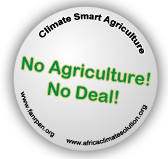 ACCID RSS newsfeed ACCID RSS newsfeed
Responding to climate justice challenges
30 October 2012, Swazi OBSERVER
URL: http://www.observer.org.sz/index.php?news=44726
Introduction
We, the faith based participants of the follow-up workshop on Pan-African Interfaith Climate Justice and Sustainable Peace in Africa from Southern and East African countries met in Nairobi from 2nd to 3rd October, 2012 under the auspices of the All Africa Conference of Churches (AACC) and Programme for Christian Muslim Relations in Africa (PROCMURA) to reflect on the worsening situation Africa is facing due to Climate Change.
We recognise that climate injustice continues to threaten all forms of life and the very human existence, current and future. We continue to witness its negative impacts such as food insecurity, health challenges, water stress, malnutrition, new disease zones and displacements, amongst others.
These glaring realities deeply challenge our faith values, mission, vision and the calling as responsible stewards towards sustainable living. This planet is God created with the potential for perpetual regeneration but with immediate limits if plundered. We do recognise the efforts and progress that have been made since the Durban COP 17. We further acknowledge the commitments and initiatives that were made in the Rio+20. We are, however, appalled by the protracted insensitivity and indifference with which climate change processes continue to be conducted locally and globally. These have led to the procrastination on critical and urgent decisions, which serve to enhance existing socio-economic inequalities and climate injustices hence, the suffering of millions, particularly our people in Africa. In this regard, we note with concern the disappointment particularly with the outcome of COP 17 which was largely viewed as an African COP yet the African voice was not heard, and we believe that Africa MUST continue to push forward and come up with concrete actions that can propel it forward.
As a result, we hereby call upon all humanity to respond to this urgent Call to Action, recognising that:
We are to draw our spiritual, ethical and moral resources to foster crucial ecological virtues, values, justice and moderation as tools for responding to wanton selfishness and greed. These remain major contributors to climate negotiations;
We all have contributed in our different ways in worsening the situation, however, we continue to strive to address the adverse effects of climate change;
The national and regional recurrent conflicts and insecurities have hampered against effective response to climate justice: not excluding poverty and gender inequalities
Overtime, we have been noting with deep concern that resources in Africa have been overexploited without sustainability benefits for the host communities;
As people of faith, we have not fully cherished our diversities with the strength that God intended, and have in effect perpetuated human segregations namely discrimination, oppression and exploitation against God’s will;
Therefore, as faith based participants, we believe that we can live in a different and better way that can change our planet for good, if we take the necessary action. As a result, we declare that the time for action has come and we need to re-examine our modes of production, policy frameworks and consumer lifestyle so as to ensure dignity for all of God’s creation.
We thus commit to:
Continue supporting the affected in our midst, advocating and promoting the oneness of our humanity and recognising that material prosperity alone, without a renewed approach to lifestyles, is not enough;
Enhance a sustainable framework for common action by harnessing our resourcefulness, particularly working together to provide integral support to those affected by climate injustices;
Accompany our grassroots structures, networks and indigenous knowledge to enhance efforts towards climate change adaptation and mitigation strategies through provision of relevant technology and initiatives;
Identifying and strengthening avenues and synergies for celebrating the creation that can bring profound changes for dignified life for the people by using our various worship materials.
We hereby call on the Eighteenth Session of the Conference of Parties (COP 18) in Doha in December 2012 to:
Have an extension of the Kyoto Protocol lifespan and the incorporation and commitment of Non-Kyoto countries – including Canada and the United States who are major polluters2 –into the Kyoto Parties.
Have developing countries that show commitments by registering their mitigation and adaptation plans, to be supported by providing new, additional, adequate, non-concessional grants and predictable support3.
Recognise, appreciate and support FBOs in the role they play in mobilising grassroots to effectively respond to climate justice challenges. Such recognition must be in the form of financial, technical and human capacity amongst others
Have an agreement that requires developed countries to go beyond the minimum set greenhouse gasses emission targets in order to avert projected global emissions peak in 2015. Urgently accelerate the actualisation of the Global Climate fund and mechanisms that were set up at COP 17 in Durban in December 2011.
We urge the African Governments to:
Urgently develop domestic resourcing strategies to finance local adaptation and mitigation initiatives.
Recognize and mainstream segments and sectors in the nations that would play a role in actualising climate change adaptation and mitigation strategies. This also calls for the involvement of youth, women and other marginalised groups within the countries as they are key stakeholders in these issues.
We hereby call on all Faith Communities to:
Work together as stewards to God’s creation, and cherishing our diversities, to promote climate justice, in encompassing ethical values to ensure that local and global interventions effectively address climate change.
Fully involve youth and women, in particular, so that they can actively participate in national and global processes on climate change in order facilitate sustainable approaches.
Conclusion
As people of faith, we make these commitments and calls, being aware of the fact that every lost moment in this very critical issue of climate change increases the irreversibility of the threat to dignified life and the future of Africa and the entire planet.
|

